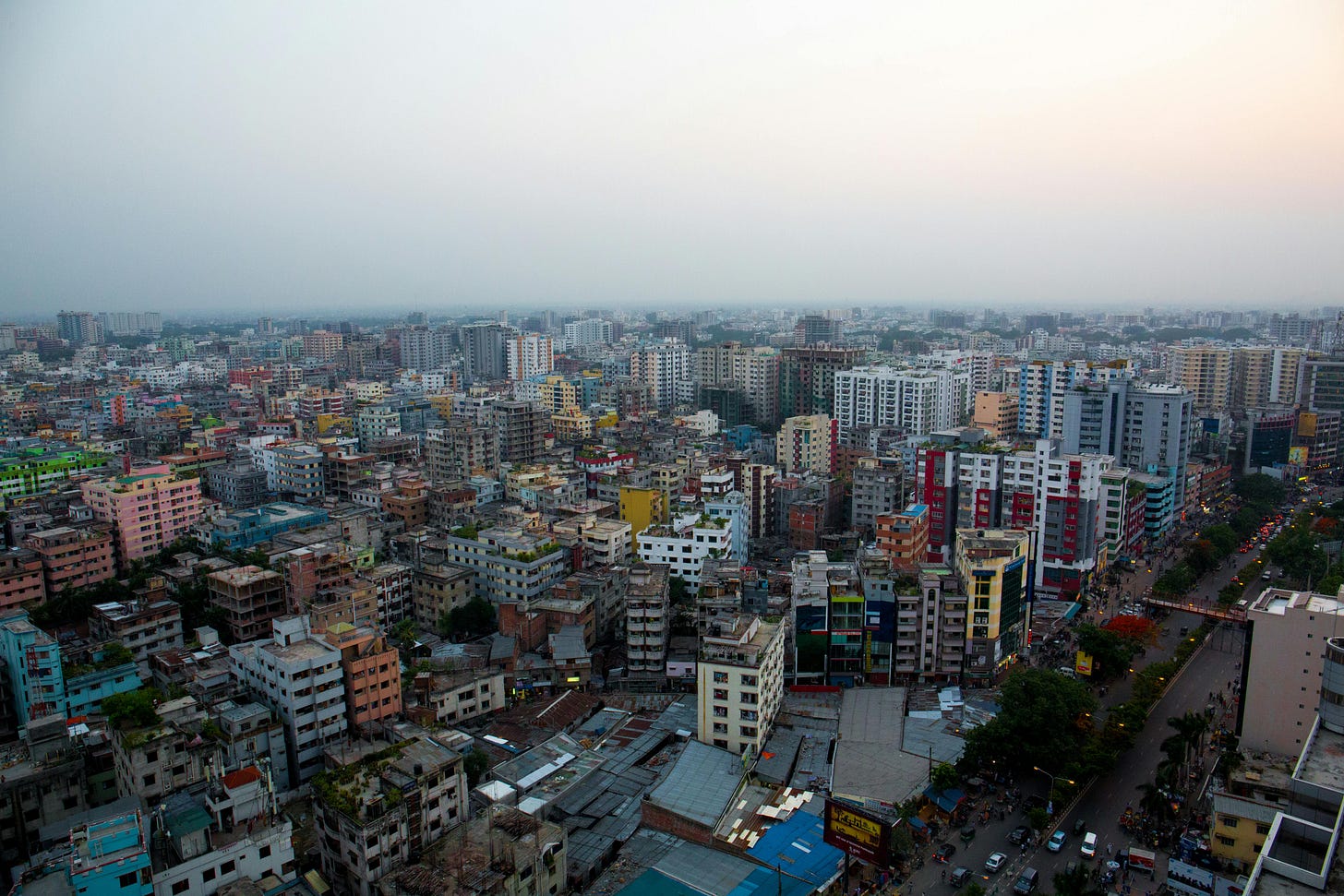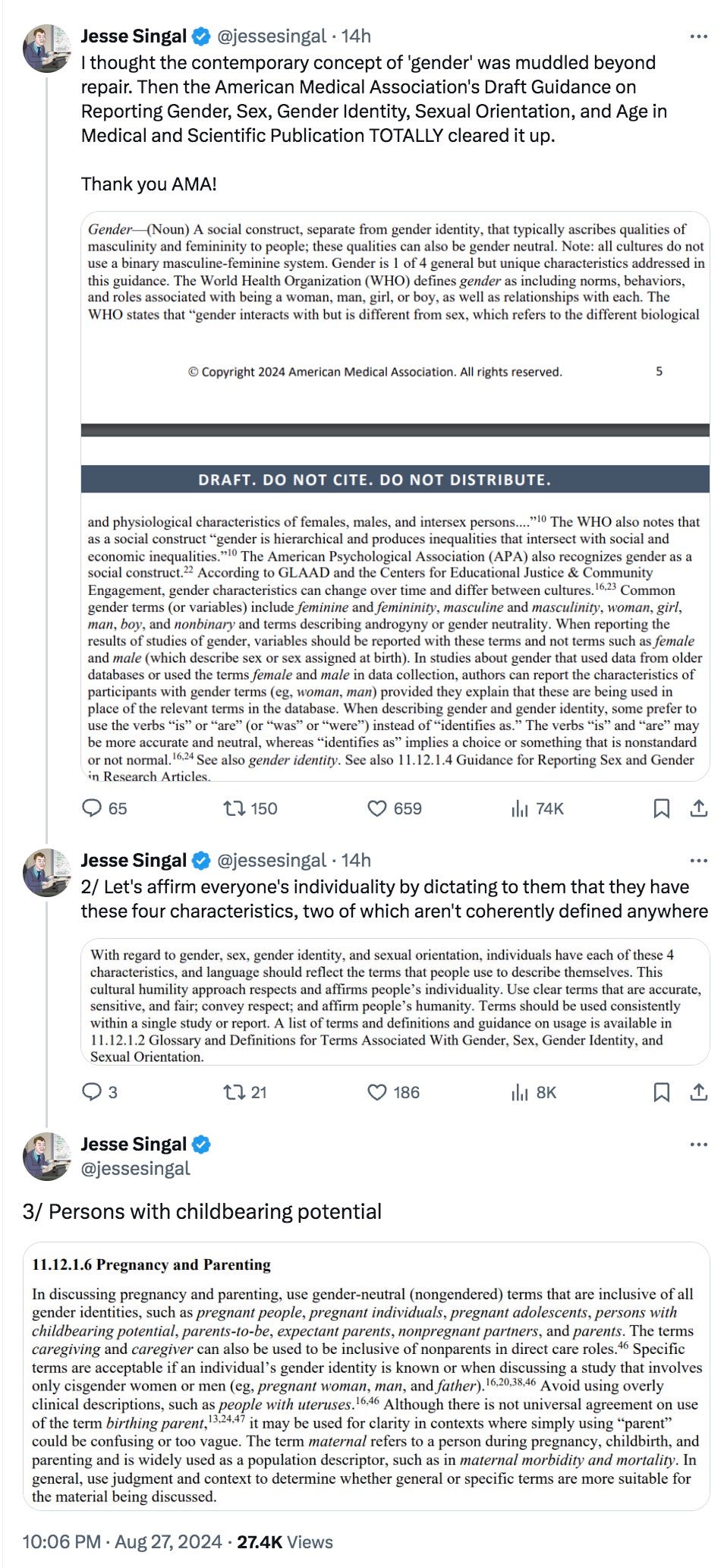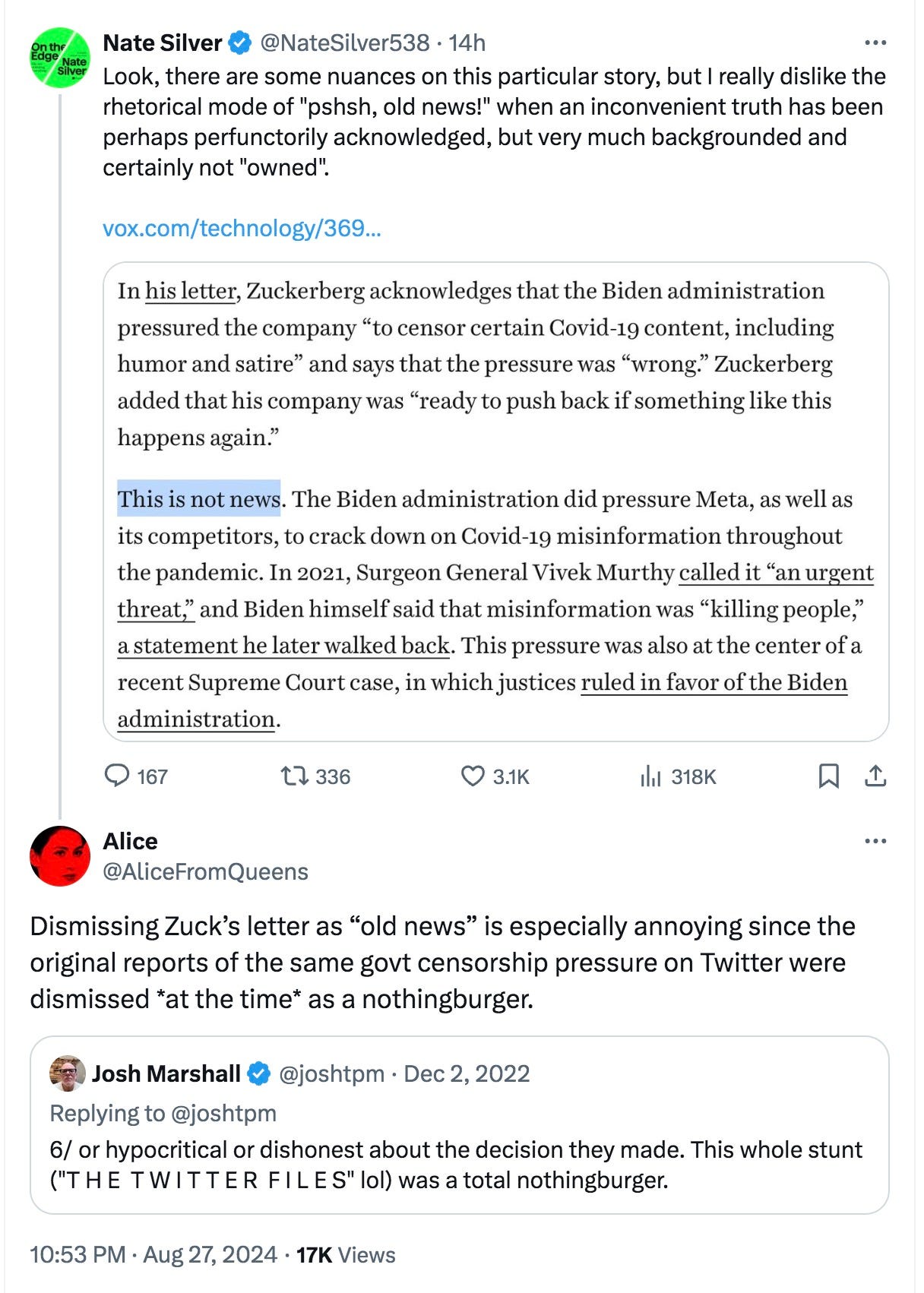E-Pluribus | August 28, 2024
Mark Zuckerberg passes the censorship buck; antisemitism isn't just for tiki torch parades; and liberalism in Bangladesh?
A round-up of the latest and best musings on the rise of illiberalism in the public discourse:
Robby Soave: Mark Zuckerberg Blames Biden for 'Government Pressure' To Censor Facebook
For several years, many Facebook users have reported being censored or even banned for spreading alleged “misinformation.” Mark Zuckerberg has confirmed that the government indeed leaned on Meta to suppress what officials found misleading or harmful, reports Robby Soave at Reason.
Meta CEO Mark Zuckerberg told the House Judiciary Committee that his company's moderators faced significant pressure from the federal government to censor content on Facebook and Instagram—and that he regretted caving to it. In a letter to Rep. Jim Jordan (R–Ohio), the committee's chairman, Zuckerberg explained that the pressure also applied to "humor and satire" and that in the future, Meta would not blindly obey the bureaucrats.
"I believe the government pressure was wrong, and I regret that we were not more outspoken about it," wrote Zuckerberg. "We're ready to pushback if something like this happens again."
[. . .]
Email exchanges between Facebook moderators and CDC officials reveal that the government took a heavy hand in suppressing content. Health officials did not merely vet posts for accuracy but also made pseudo-scientific determinations about whether certain opinions could cause social "harm" by undermining the effort to encourage all Americans to get vaccinated. The CDC took the position that expressing skepticism about vaccinating children—most of whom are not at risk of a negative COVID-19 outcome—was a form of misinformation and should be policed.
[. . .]
But COVID-19 content was not the only kind of speech the government went after. Zuckerberg also explains that the FBI warned him about Russian attempts to sow chaos on social media by releasing a fake story about the Biden family just before the 2020 election. This warning motivated Facebook to take action against the New York Post's Hunter Biden laptop story when it was published in October 2020. In his letter, Zuckerberg states that this was a mistake and that moving forward, Facebook will never again demote stories pending approval from fact-checkers.
"We've changed our policies and processes to make sure this doesn't happen again," wrote Zuckerberg.
Read the whole thing.
Suzy Weiss: A Reality Check for Woke Jews
What does an antisemite look like? The Free Press’s Suzy Weiss reports that the answer has come as a shock to some, who found out they were on the “wrong” side of the Israel-Hamas conflict.
Joshua Leifer—a leader of the anti-Zionist organization IfNotNow and author of the new book Tablets Shattered, about how American Jewish life has gone down the tubes—was denied entry to his own book launch at an indie bookstore in Brooklyn. Why? Because the rabbi who was supposed to interview him is a Zionist, and, according to Leifer, “they would not permit a Zionist on the premises.”
I don’t think a more perfect metaphor exists for woke Jews in the year 2024.
“My biggest worry was about synagogues not wanting to host me,” Leifer posted on X about the ordeal. “I didn’t think it would be bookstores in Brooklyn that would be closing their doors.”
He didn’t?
I guess life comes at you fast when you spend your career making dizzying academic arguments against the existence of a Jewish state, only to be told, “Nice words, Jewboy, leave the store immediately.” (The bookstore owner came out and blamed a lower level staffer.)
Leifer’s real-time mugging by reality must sting. Antisemites, to Leifer and his ilk, carry tiki torches and have shaved heads. They don’t live in Brooklyn and have pronoun pins and tiny tattoos.
Read it all here.
Debasish Roy Chowdhury: Can Bangladesh Snatch Liberalism from the Jaws of Military or Islamist Rule?
While Bangladesh rarely makes the news, recent events are worth noting as the country has a chance to make a break with its authoritarian past. Writing for The Unpopulist, Debasish Chowdhury warns that the chance is still a slim one. Just as the Arab Spring quickly fizzled, Bangladesh’s opportunity for progress may be fleeting.
As soldiers exchanged greetings with students protesting the now-deposed Bangladesh prime minister Sheikh Hasina Wazed this month, the scenes at Dhaka’s Shahbag Square evoked memories of Cairo’s Tahrir Square one February night 13 years ago. The Tahrir uprising spelled the end of Hosni Mubarak’s 30-year rule in Egypt. Likewise, Shahbag’s led Bangladesh’s powerful army to withdraw support for Hasina, tilting the balance of power in favor of the protesters after a two-month stand-off.
The popular protests that brought the curtain down on Hasina and forced her to flee to India have drawn obvious parallels with the Arab Spring. But it’s an unhappy comparison since that movie did not end well. Indeed, most countries that constituted that moment transitioned not into rights-protecting democracies but just a different kind of despotism.
[. . .]
As a flag-bearer of Bengali nationalism, Hasina had projected herself as a radical secularist since her second stint as prime minister in 2009. Her hard line can be traced back to a Harvard International Review essay authored by her son Sajeeb Wazed Joy and former American army officer Carl J. Ciovacco in November 2008. In it they highlighted the risks of Islamization in Bangladesh and offered secularization as a prescription for deradicalization. Hasina used secularism strategically to consolidate her rule, not only cracking down on Islamist organizations but on rival political parties as well, branding all political opposition as Islamist.
As in much of the Middle East, the West (along with local powers like India) looked away from Hasina's despotism because it feared that the alternative was Islamism. Now, as the revolution ends, and life returns to normal, there’s little clarity on who will actually control state power; a secular Bangladesh—with all its imperfections and pretenses—might very well be on the wane given the forces that will most likely benefit from Hasina’s downfall.
The students leading the movement have a progressive vision for Bangladesh, and the interim government led by celebrated microfinance pioneer Muhammad Yunus has laid out a liberal roadmap. But neither has an organized political structure to retain power. Yunus is powerful only as long as he enjoys the trust of the students and Bangladesh needs a liberal face to calm domestic and international jitters till the dust settles. The student protesters are powerful only as long as they occupy the streets.
[. . .]
The interim government running the country includes two leaders from the progressive “Anti-Discrimination Students Movement” that helmed the agitation against Hasina. The students are also reportedly considering floating their own party to end the duopoly of the Awami League and the main opposition party, the Bangladesh National Party (BNP). Power in Bangladesh has traditionally rotated between these two parties and the military. But the Awami League is in disarray and the success of a new party—if one is formed at all—is uncertain. That leaves the military, the BNP and its past Islamist ally, Jamaat-e-Islami, as the potential beneficiaries in a post-Hasina Bangladesh. One could be forgiven for wondering if Bangladesh is trading one kind of despotism for another.
[. . .]
Successful uprisings, after all, rarely lead to genuine democratic transitions. Apart from Tunisia, where the Arab Spring began in 2010 and had some limited success, in none of the other countries facing popular protests against authoritarianism then did democracy actually take hold.
[. . .]
Student activism in the past has definitively shaped Bangladesh, from the language movement in the 1950s demanding official status for Bengali that culminated in Bangladesh’s secession from Pakistan, to the many revolts against military and civil despotisms thereafter. This time, apart from standing up to an apparently invincible authoritarian, the students showed the way in steadying a rudderless country in the aftermath of Hasina’s fall. They managed public order, provided security, and cleaned and repaired damaged public places amid the chaos.
But effecting widespread systemic changes is something else. Toppling a despot might seem easier in comparison.
Read it all.
Around Twitter (X)
The American Medical Association is rethinking “gender” and Jesse Singal is less than impressed:
Commenting on a Vox article pooh-poohing Mark Zuckerberg’s comments about government pressure on Meta (see item #1 above,) Nate Silver warns of the “old news!” technique. Megan McArdle joins in.
And finally, while RFK Jr. has dropped out of the presidential race, it’s not all bad news. He’ll now have more time to criminalize chemtrails. Whew!










